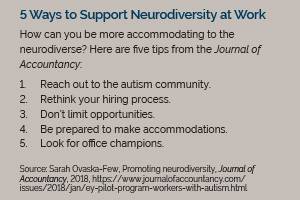Neurodiversity in Accounting: A Career Match
November 13, 2023
by Tori Smith

Neurodiverse employees are an untapped talent pool.
Diversity, equity and inclusion (DEI) efforts have swept the accounting nation and generally take the form of inclusiveness among different races, genders and abilities. Neurodiversity is another piece of the DEI pie.
The term “neurodiversity” was coined by Australian sociologist Judy Singer and is a synonym for all humanity, a category of intersectionality, and a civil rights movement for psychomedically labeled minorities and their allies. It does not mean neurologically disabled.
Judy argues that the entire population is neurodiverse because each person has a unique brain.
The term was first published in Singer’s 1998 sociology honors thesis at the University of Technology Sydney. A full version of the thesis is included in Singer’s new book, NeuroDiversity: The Birth of an Idea.
According to Singer, the neurodiversity movement is an umbrella term that can include many interests of various psychomedically labeled minorities, including but not limited to attention-deficit/ hyperactivity disorder (ADHD), autism, tics, learning disabilities, speech, and others.
Attracting Neurodiverse Candidates
Given the current focus on DEI in the workplace, business leaders are educating themselves on neurodiversity and implementing neurodiverse-friendly practices within the hiring process.
Katie Brennan, an HR advisor from the Society for Human Resource Management (SHRM), said that since COVID-19, there has been a greater overall push for DEI efforts.
“It became a priority overall that included disability,” said Katie. “There was value in a diverse workforce and seeing how a DEI program could retain talent.”
Although an obvious initiative for an organization is to partner with an organization that can walk them through the process of being neurodiverse-friendly, Katie said there are a few things that smaller organizations can do to be more inclusive.
“Smaller organizations can … post positions, partner with disability-related organizations, attend disability-related job fairs, include goals to attract individuals with disabilities, and consider simplifying job applications to make them more friendly,” she said. “The goals would be more of an internal goal. They might set goals to attract marginalized talent; it doesn’t have to be something necessarily that applicants would see.”
Some larger organizations have already adopted programs to accommodate the neurodiverse hiring population.
“Bigger companies have started programs in the last 10 years that tend to be tech and finance companies, companies that have repetitive tasks,” said Katie. “Those companies realized sooner than many others that there’s an untapped talent pool.”
Several large companies that have neurodiversity-focused programs are EY, Deloitte, Dell, Ford, and JP Morgan. Colleges and universities are also jumping on board; the College of William and Mary has a program for neurodiverse students.
While hiring a neurodiverse individual, the company may need to make accommodations so the employee can thrive. This includes, but is not limited to, allowing the employee to wear noise-canceling headphones, moving an employee due to a loud environment, and more. Katie said that, typically, the accommodations she sees don’t cost a lot of money to the company, if any.
Neurodiversity and Accounting are a Good Fit
According to Katie, there are multiple reasons a neurodiverse person would be suited for a career in accounting.
“Generally speaking, they often have a keen level of attention to detail, as well as accuracy and ability to detect errors, and when we’re talking numbers, that’s critical,” she said. “Accounting can be sort of autonomous, and the idea of not interacting with the public can be attractive.”
Even though Katie said that they might prefer to work alone, that isn’t to say they wouldn’t add benefit to the team.
“They [have] innovation, creativity and problem solving,” she said. “They view situations through a different lens and have so many different perspectives.”
Neurodiverse individuals interested in accounting can start with their job searches. According to Katie, larger companies usually have a web page that mentions different protected statuses that will disclose their neurodiversity practices. She said it’s a good way to gain an understanding about who they are.
Regarding asking for an accommodation, “Simply say, ‘These are my limitations, and I would appreciate support,’” she said. “If the employee knows what support will help them, they and the employer can list them out. In most cases, they will be required to accommodate them. It wouldn’t be anything that was a formal conversation.”
A 2020 UK study by the Institute of Leadership & Management found that 50% of the UK’s employers admitted they wouldn’t hire someone with a neurodivergent condition. Katie wants employers to make changes to hiring practices. “I hope to see more employers embracing it and making a great effort to attract neurodiverse talent throughout multiple mediums without sticking to their same talent strategy."
“The neurodivergent are highly unemployed. For most of us, regardless of cognitive differences, having a job gives us a sense of self-worth,” Katie said. “That’s undefinable.”

80% of the neurodiverse population are unemployed, despite being an untapped talent pool.
— Harvard Business Review

Tori Smith is a student at Ball State University in Indiana and the Virginia Society of CPAs summer communication intern.
Reprinted with permission from the Virginia Society of CPAs.
Continue Reading
“The autism spectrum: An untapped talent source” — Tennessee Society of CPAs
“Neurodiversity as a competitive advantage: Why you should embrace it in your workforce” — Harvard Business Review
“Promoting neurodiversity” — Journal of Accountancy
